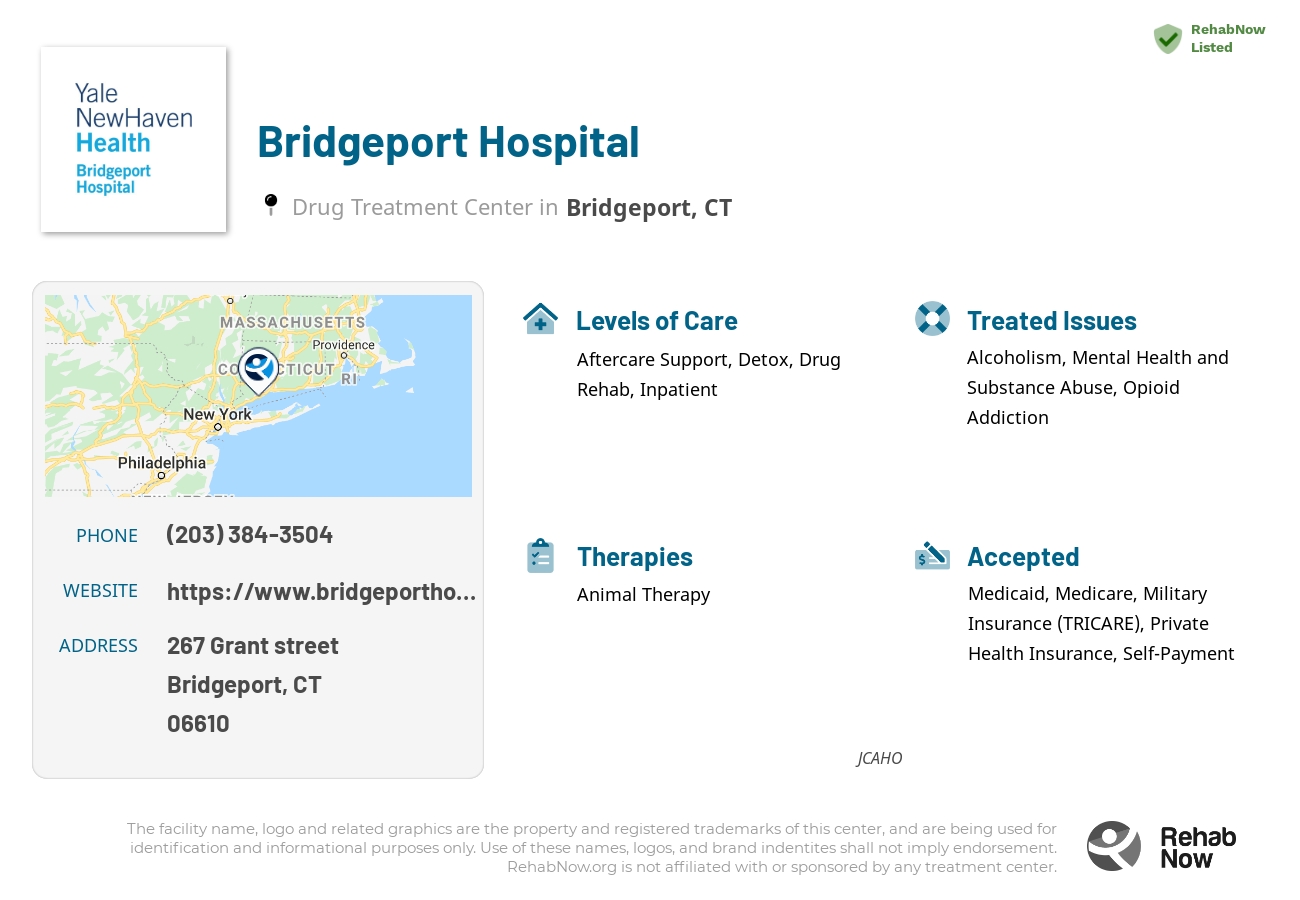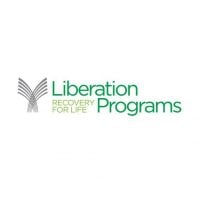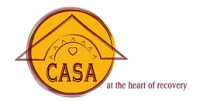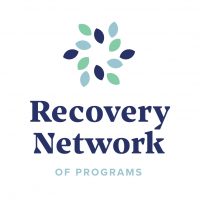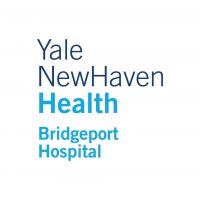
Bridgeport Hospital
Drug Rehab Center in Bridgeport, Connecticut
- Substance Abuse
- Opioid Addiction
- Mental Health
- Dual Diagnosis
- Drug Addiction
- Alcoholism
Bridgeport Hospital is an accredited JCAHO facility offering a comprehensive, evidence-based drug rehab program with medically managed detoxification and inpatient/outpatient levels of care, plus aftercare support.
About Bridgeport Hospital in Connecticut
Bridgeport Hospital, located in Bridgeport, CT, specializes in providing short-term inpatient detox and stabilization for individuals seeking sobriety from drugs or alcohol. Alongside substance abuse treatment, they offer group therapy for mental health issues, distinguishing themselves as a comprehensive care provider in Fairfield and New Haven counties.
Accredited by the Joint Commission on Accreditation of Healthcare Organizations (JCAHO), Bridgeport Hospital is acknowledged for its high-quality care standards. Their services extend to individuals grappling with alcoholism, dual diagnosis, opioid addiction, drug addiction, and other substance abuse issues, offering a beacon of hope for recovery.
- Expert Medical Care: As home to the state’s only burn center, the hospital extends its expertise to myriad medical fields, including addiction recovery.
- Comprehensive Treatment Options: From inpatient detoxification to outpatient support, tailored programs address diverse needs.
- Supportive Aftercare: Dedicated to lasting recovery, they provide aftercare services to help patients successfully reintegrate into their daily lives.
Treating a range of addictions, including alcoholism, opioid addiction, and dual diagnosis, Bridgeport Hospital employs detoxification, group therapy, and both inpatient and outpatient care to support individuals on their journey to sobriety.
Genders
Ages
Modality
Additional
Accreditations

JCAHO
Conditions and Issues Treated
Many people need to recover from substance abuse to live a healthy life. In the end, if you can get through all the steps: detoxifying your body, rehabilitation after some time or when needed (depending on the type), and recovery while also receiving therapy support throughout the process, it can be worth it.
A detoxification center is a common place to start the recovery process from substance abuse. With your body and mind restored, you can continue to heal without the lingering effects of drugs.
Many people who struggle with opioid addiction need to attend specific programs like methadone , Suboxone or Vivitrol clinics.
These types of programs will provide the patient with legal, prescription medications that can help them overcome their cravings for illegal opioids like heroin or fentanyl . If the patient has a chronic condition like Hepatitis C, they must undergo treatment before they can begin taking these medications.
Levels of Care Offered
This center offers a variety of custom treatment tailored to individual recovery. Currently available are Aftercare Support, Detox, Drug Rehab, Inpatient, Outpatient, with additional therapies available as listed below.
Detox refers to the progressive elimination from the body of toxins. The detox period depends on the form of addiction, the length of drug abuse, and the state of health. Under the supervision of medical practitioners, MAT detox based in Bridgeport, CT requires the use of medications.
Inpatient treatment is an intensive program that takes place when a patient checks into a rehabilitation facility. The treatment includes detoxification and counseling sessions, which are round the clock. Outpatient treatments are also available, but inpatient care is advised as the first step of rehabilitation.
Intensive rehab ensures the patient stays in a substance-free atmosphere, improving treatment success rates. The patient participates in group therapy for motivation from other patients who have overcome addiction. Family members are also involved in providing emotional support throughout the program.
An outpatient treatment program is set up to help with alcohol or drug addiction, or a co-occurring disorder. The patient must attend the Connecticut facility for their therapy and other programs but are able to return home each night. The frequency of mandatory attendance decreases after much of Bridgeport Hospital‘s program is complete.
Aftercare is a term that’s used to refer to any sort of continuing care offered for a drug addict who has voluntarily entered a rehabilitation program. This type of care can be provided in several settings, including outpatient therapy sessions after the addict has completed an inpatient program. There are also 12-step support groups, such as Alcoholics Anonymous, which can provide additional help for addicts trying to stay sober.
Therapies & Programs
Individual Therapy is a critical component of addiction recovery. Therapists work with patients to identify the root of their addiction and figure out how to better handle the issues that led to them using drugs. Individual Therapy is the one-on-one session where people meet with their therapist. Individual therapy provides a safe space for people to open up and discuss personal and sensitive topics which they may not feel comfortable discussing in a group setting.
Family therapy will also help families realize that the addiction is not their fault. For many years, people blamed themselves for an addict’s behavior and felt that they had done something wrong. This is not the case. Addiction is a disease, and it can strike anyone, even if their life seems fine from the outside. It can bring a lot of shame to a family when they have an addict in their midst, but if everyone is open and honest with each other, then they can help everyone stay in recovery.
Group Therapy is utilized by drug treatment centers like Bridgeport Hospital to provide the recovering drug addict with a platform to talk about their feelings and experiences. It also provides for an opportunity to learn from other addicts who have successfully overcome their addiction.
Group Therapy is employed in lectures, seminars, or discussion groups (the latter two are typically conducted as “therapy groups”). It is recommended that all group members be recovering addicts for this type of therapy to work (though it does not exclude others with lived experience).
Patient Experience
Experiential Therapy at Bridgeport Hospital
Experiential therapy is another form of treatment that helps addicts overcome their addiction. This type of service typically involves hands-on activities with the focus on physical experiences instead of emotions or beliefs.
Some examples include art therapy, equine therapy and music therapy. Each of these forms of experiential therapy can provide unique ways for addicts to channel their feelings and work through their demons. This type of therapy also allows addicts to develop meaningful emotional connections with others, which can prevent them from resorting to relapse as a coping mechanism.
Payment Options Accepted
For specific insurance or payment methods please contact us.
Is your insurance accepted?
Ask an expert, call (888) 674-0062
Additional Details
Specifics, location, and helpful extra information.
Bridgeport, Connecticut 6610 Phone Number(203) 384-3504 Meta DetailsUpdated April 15, 2024
Staff Verified
Bridgeport Hospital Patient Reviews
There are no reviews yet. Be the first one to write one.
Bridgeport, Connecticut Addiction Information
Connecticut has a higher rate of substance abuse and addiction than the national average. The state ranks in the top 10 in the country for illicit drug dependence among those ages 18 to 25. In 2010, there were 9,211 people admitted to an alcohol treatment facility for alcohol abuse combined with a secondary drug. Connecticut ranked fifth in the United States of America for the number of fatalities involving drunk driving in 2014.
10% of Bridgeport residents reported using illicit drugs. There were 2,737 drug-related incidents in 2019. Of these incidents, 1,964 were for illegal drug use or possession and 773 were for drug paraphernalia. 28% of people who abuse drugs are also alcoholics. Drug and alcohol rehab centers in Bridgeport offer a variety of treatment options that can help people recover from addiction.
Treatment in Nearby Cities
- Litchfield, CT (38.6 mi.)
- Windsor, CT (53.3 mi.)
- Bridgeport, CT (1.4 mi.)
- Milford, CT (6.0 mi.)
- Chester, CT (38.4 mi.)
Centers near Bridgeport Hospital
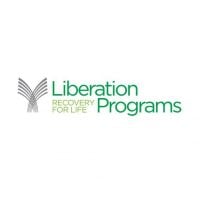


The facility name, logo and brand are the property and registered trademarks of Bridgeport Hospital, and are being used for identification and informational purposes only. Use of these names, logos and brands shall not imply endorsement. RehabNow.org is not affiliated with or sponsored by Bridgeport Hospital.


